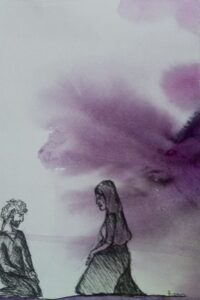 Do you remember the women’s power suits of the 1980s? They were navy blue or black, just like a man’s suit. There was a jacket with lapels and a pencil shirt with a discreet kick-pleat and a hem that hit just around the knees. The suit was accompanied by high heels, but not too high, with closed toes and closed heels. Some jewelry was allowed; perhaps a subtle pin on the lapel and an interesting wristwatch, but certainly no dangling earrings nor clanking bracelets. The white blouse, like a man’s white shirt, was collared at the neck. And at the neck there was a soft bow, marking the difference from the man who sported his Windsor-knotted ties. It was the blouse that showed that a woman, trying to succeed in a man’s world, still retained an inherent softness while competing with the best of them to climb the corporate ladder and make a name for herself. Eventually work attire changed for both men and women and individuality took hold. But for a time women tried to prove themselves equal to men by looking as close to them as possible.
Do you remember the women’s power suits of the 1980s? They were navy blue or black, just like a man’s suit. There was a jacket with lapels and a pencil shirt with a discreet kick-pleat and a hem that hit just around the knees. The suit was accompanied by high heels, but not too high, with closed toes and closed heels. Some jewelry was allowed; perhaps a subtle pin on the lapel and an interesting wristwatch, but certainly no dangling earrings nor clanking bracelets. The white blouse, like a man’s white shirt, was collared at the neck. And at the neck there was a soft bow, marking the difference from the man who sported his Windsor-knotted ties. It was the blouse that showed that a woman, trying to succeed in a man’s world, still retained an inherent softness while competing with the best of them to climb the corporate ladder and make a name for herself. Eventually work attire changed for both men and women and individuality took hold. But for a time women tried to prove themselves equal to men by looking as close to them as possible.
Huldah was a prophetess in a man’s world and in a world riddled with sin. The land of Judah had turned into a place of Baal worshippers. King Josiah, a good and faithful man, had had enough. He ordered the idols to the false gods be smashed and their altars demolished. While the temple was being restored to its place of proper importance, an ancient book of the law was found. King Josiah read it and knew too well that the people of the land were not following God’s law. So he sent a priest and others to Huldah to ask her for clarity on God’s intentions.
Surely there were male prophets in the land. Huldah lived near the time of Jeremiah, one of the most famous prophets of all times. Why didn’t the priest seek out Jeremiah or another male prophet? Why did the priest go to the prophetess, Huldah?
Some have conjectured that the priest did not want to hear the words from Jeremiah who was known to be the “prophet of doom”. Perhaps the priest was looking for that inherent softness that could be found in a woman. Perhaps he hoped that Huldah would temper God’s intentions for the disobedient people of Judah. But no, Huldah spoke God’s words and was as tough as any man in condemning Judah. “Thus says the Lord, I will indeed bring disaster on this place and on its inhabitants … my wrath will be kindled against this place, and it will not be quenched.”
The softness shines through as Huldah prophesied the fate of King Josiah. “You shall be gathered to your grave in peace; your eyes shall not see the disaster that I will bring on this place.” As the voice of God, I want to believe that Huldah was speaking with the softness we ourselves can find in God. “We have followed too much the devises and desires of our own hearts, we have offended against the holy laws.” Through Jesus Christ we have come to learn that we are forgiven and God does not bring disaster upon us. Disaster may come, yes, but God brings us love and hope for a better tomorrow.
We women have the gift of softness. We show it in the easy times when we chat over coffee with a friend or drink from imaginary teacups with our children and grandchildren. We also can show it when we have to make tough decisions and speak honestly in difficult situations. Huldah didn’t hold back and we shouldn’t hold back, either. But like Huldah we can remember the softness found in God, a hen that gathers her brood under her wings, and with God’s help we can help others find the love of God and the promise of a better tomorrow.
++++ Coming March 1st ++++
Chapter 19
Anna
Content provided by Author Lindsay Hardin Freeman
Illustration: Claire Elam
